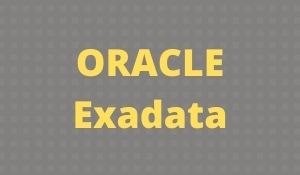
What is Exadata?
Exadata is a database machine designed by Oracle that offers users optimized functionality about enterprise-class databases and their associated workloads. Exadata is a composite database server machine that uses Oracle database software and hardware server equipment enhanced by Sun Microsystems.
Oracle calls Exadata the fastest database server ever built, primarily due to its highly powerful and intelligent database, where query completion time is ten times faster, even in a vast data warehouse.
Major Benefits of Oracle Exadata:
•Flash Cache – It can consist of solid-state disks. Caches hot data (data frequently used).
•Storage index – It utilizes the minimum/maximum values to help queries run faster.
•Smart scans – The smart scans can be performed at the hardware level by Oracle.
•Hybrid Columnar Compression – The Information is organized by a hybrid of column and row formats and then compressed.
•Security – The encrypted backup with change tracking file, in which the storage nodes provide hardware encryption acceleration.
•Utilities – CellCli is a command-line interface for queries at the hardware level and for monitoring different health metrics for each cell. DCLI is for querying multiple cells, and ADR Command Interpreter is for diagnostics.
Key Advantages of Exadata:
The advantages of Oracle Exadata are discussed below:
Optimized for Oracle Database: While databases are growing, meaning more data, multiple copies, etc, clients start to have requirements for more servers, more storage, and more power. All that means more complexity, more prices, more risks of errors, etc. With an infrastructure engineered to work together with Oracle Database, Oracle Exadata delivers far more power with less hardware. It removes IT complexity and delivers greater performance, scalability, security, and data protection.
| Learn more information from the GoLogica “Oracle Exadata Training“ |
Workload performance and scale: Exadata increases employee productivity and assists grow revenues with less price and complexity vs traditional approaches. Performance is up to a hundred times faster, lets clients access data more easily, and engages with clients more quickly.
Operationally efficient: Oracle Exadata delivers greater database and application performance with less hardware and fewer licenses. With Oracle Exadata, clients have a major advantage in terms of easier upgrades, tuning, patching, etc. Scalability means newer models work with older models by design.
Availability and security: Data security and database uptime are crucial for business operations and revenue growth. There are too many points of control to monitor and maintain and in most cases not enough budget for the specialist skills needed to manage it. With hardware and software working together, Exadata eliminates system downtime, using built-in resilience and redundancy. The advantages are manifested in less IT impact in managing downtime, less business impact from outages, etc..
Latest Developments of Exadata:
Exadata X8 state-of-the-art hardware developments include the latest Intel Xeon processors and PCIe NVME flash technology to drive performance improvements, a 60% increase in Input/Output throughput for all-Flash storage, and a 25% increase in IOPS per storage server compared to Exadata X7. Each Exadata X8 storage server now features 60 percent more cores to offload Oracle Database processing and 40 percent higher capacity disk drives to support massive information growth and database consolidation strategies. These improvements come with no cost increase, further improving the price effectiveness of the Exadata platform.
Additionally, a new, much lower price extended storage server is available for storing infrequently accessed, older, or regulatory data. At Hadoop/object storage costs, all client data now receives the advantages of the Exadata scale-out architecture and Oracle Database storage, including application transparency, consistency of operational models, hybrid columnar compression (HCC), and the same security model with encryption across all tiers.
Market Share of Exadata:
The Oracle Exadata Database Machine is a computing platform that is specialized and optimized for running Oracle Database. The main aim of Exadata is to achieve higher performance and availability at a lower price by moving database algorithms and intelligence into storage and networking, bypassing the traditional processing layers. Oracle Exadata has a market share of about 0.49 percent. The average salary paid for an Exadata Developer is around $90.8KÂ PM . We provided quality content regarding Oracle Exadata. Even beginners can learn and understand easily. This syllabus will be more than enough to appear for certification and interviews confidently. We provide the best Oracle Exadata online training with highly qualified professionals who have more than 18+ years of experience. Our team of experts is available to help you learn Oracle Exadata online training by providing continuous support. GoLogica is offering updated Interview Questions for 2025 that will help you achieve your dream job.
Related Courses
| Course Name | Enroll Now |
|---|---|
| Oracle Exadata Training | Enroll Now |
| ORACLE DBA 11g/12c TRAINING | Enroll Now |
| Oracle Apps DBA Training | Enroll Now |
| ORACLE OSB TRAINING | Enroll Now |
| ORACLE APPS TECHNICAL TRAINING | Enroll Now |



